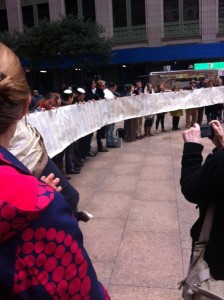#OccupyJudaism
Last Updated on Wednesday, 26 October 2011 09:15 Written by bryfy Wednesday, 26 October 2011 09:15
This blog post is about #OccupyJudaism – and yet it isn’t. I am not going to comment about political agendas, specific personalities or the loud beating of drums – there are many others out there who can do so with far more insights that I have on these and other related issues. My reference point is last Friday afternoon, as a brisk breeze came over lower Broadway and a group of perhaps 50, maybe 100, people gathered across the way from Zucotti Park.
It was Simchat Torah and this group had gathered to mark the culmination and the beginning of the reading of the Torah cycle. To be sure this was no ordinary Simchat Torah ceremony. As the group formed a circle the Torah was unrolled so that every person could touch the parchment. The leader of the ceremony then moved quickly (some would say skipped) around the inner circle, calling out highlights of the Old Testament, which were then echoed by the circle members. “In the beginning,” the leader called out, and everybody responded “In the beginning.” “Am I my brother’s keeper?” “Justice, Justice pursue.” The echoing was as much about involving participants as it was about ensuring that everyone could hear what was going on. In scenes that must have resembled many ancient practices, the absence of microphones, and the continual noises from the bustling streets and protests from lower New York, this human amplification system was essential and simultaneously poignant. There were other parts to the ceremony, including individuals connecting with words from the Torah and more traditional readings, as well as continual singing, nigguning, hand clapping, and a mixture of bopping and shockling.
Who were these people? Why had they chosen to come to this celebration and not to others? Who was leading this ceremony, and who was not? Where else were Simchat Torah celebrations taking place at this time, with people like these, and with people not like these? Who were the onlookers and why were they so enthralled with what was taking place? Why did the group of black teenage girls come and watch the Torah being unfurled? Why did the policeman engage in conversation and then stay for the remainder of the ceremony? Why did the two men in suits behind me, clearly just walking past, start reciting prayers in Hebrew?
#OccupyJudaism is just one example of the many expressions of Jewish practice that are emerging in the 21st century. Add to that the shteiblach, the Moishe Houses, the independent minyanim, pot luck Shabbat dinners in people’s homes, and any number of other Jewish practices – there are changes taking place in the Jewish world today.
There are many things that are unique about all of these experiences and there are also many features that they have in common. They have leaders and yet they are either leaderless. They have core prayers, yet they embrace individual liturgy. They are coordinated and yet they are decentralized. They occur largely because of word of mouth, yet they rely on social media to amplify their voice. Among their participants are learned scholars who more often than not value the wisdom of those who surround them more than their own knowledge. They are voluntary, and yet there is often embedded a sense of people feeling a need to be there and to be present. They are all meet around the Jewish calendar and yet at their core they are about people, connections and relationships with one another, with tradition and with a higher purpose. They are all steeped in tradition and they are all grounded in contemporary, relevant and personally meaningful realities.
As organizations, denominations, and institutions lament the absence of young people (and it isn’t just young people), politics and protests aside – there is something going on at #OccupyJudaism that the Jewish community needs to be paying attention to.


It strikes me that this “something going on” is about being a “prosumer”. It’s not just about PRODUCING, it’s about creating and owning. This perspective, these models of organizing, these paths to creating meaning and building community are so different than what we’ve seen in the past generation or two, which makes it hard to understand in a theoretical way. But it’s apparent from your account, from the video, from what others are experiencing, that there’s really something happening here, and we do need to pay attention, listen and learn. Perhaps instead of staying on the outside and observing, we should encourage communal leaders to step inside. Na’aseh v’nishmah.